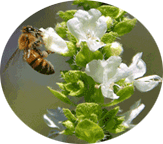Candida Diet Food List
© Bee Wilder, March 10, 2015
Carbohydrates (carbs) are foods that are not classified as protein or fat, which are foods that grow in soil (ground, dirt), including vegetables, fruits, grains, nuts, seeds, herbs, spices, etc.
Also see the lists below each group of foods for additional information.
1 Organ meats include heart, liver, kidneys, gizzards, sweetbread
(pancreas), etc. It is advisable to have 1 serving of red meat liver (beef, bison, venison, lamb, pork) once a week because it is high in nutrients compared to poultry liver (chicken, turkey, etc.) — see Liver Nutrients and Liver Nutrient Comparison Chart.
2 Fish and shellfish must not contain nitrates, sulphites, nor other preservatives, i.e. sodium phosphate, disodium phosphate, etc. See #3 below. Canned fish should be packed in spring water or olive oil. It is advisable to have at least 1 serving of fish a week.
3 Canned tuna should be skipjack or albacore, and not bluefin
or yellow fin tuna, nor any canned tuna that does not identify the kind of
fish on the label. It should be packed in spring water or olive oil.
4 Regular commercial unsalted butter that does not contain “natural flavoring” (a term companies use to hide neurotoxic substances like MSG) and it contains only cream and lactic acid or bacterial cultures is okay. The ideal butter is raw (unpasteurized); check to see if it is legal in your area.
5 Use Extra Virgin Olive Oil. It should be cold- or expeller-pressed, and only in very dark bottles which protects it from being damaged by heat, light and air. Do not cook with olive oil since it is damaged by heat. Only use it unheated in salad dressing, mayonnaise, etc.
6 Bacon and ham should be “free of” nitrates, sulphites, salt, sugar, flavorings or spices, and they must be unsmoked (smoking meats creates nitrate–like substances). It is not necessary to cure bacon or ham.
7 Shrimp must not contain nitrates, sulphites, nor other preservatives, i.e. sodium phosphate, disodium phosphate, etc.
8 Butter Oil – Deep yellow butter oil is from cows eating rapidly growing green grass in the Springtime. It contains vitamins A and D and also the X Factor nutrient discovered by Dr. Weston A. Price. It can be used as a supplement to regular butter. Here’s more information and where
to buy Butter Oil.
9 Clarified Butter/Ghee – Some people believe they are intolerate of the proteins in dairy products because of their reactions, so they have ghee instead of butter. Clarifying butter (makes ghee) is a process that removes milk proteins, including casein, from butterfat. However, proteins in butterfat are not the reason for such reactions, since all Healing Foods, Herbs & Spices Create Healing Reactions. Note: Ghee is not as healthy as butter because it does not contain important proteins that are in butter.
All of these foods are Carbs (plant foods), except for the Beverages. Some carbs on this list are high in carbs/sugars, so be cautious by only consuming small amounts, including the onion family (garlic, leeks, onions, scallions), pumpkin, lemons, limes, and spices (that are used sparingly anyway).
Swiss Water Processed decaf coffee is the only process that does not use chemicals to remove the caffeine. Remember that not all of the caffeine is removed, so it should be consumed in small amounts.
The best water is regular tap water because it contains all of Nature’s wonderful minerals. There are no processed mineral products that can possibly duplicate Mother Nature. Use a charcoal filter to get rid of the chlorine and some other contaminants, such as Britta or PUR water filters that does not add minerals. Do not be concerned about fluoride in water since it is a heavy metal that is easily eliminated by the fats and other nutrients on this program. Do not drink distilled water, reverse osmosis water, softened water (contains too much salt), or bottled water that has salt added or is in unsafe plastic containers. Distilled and reverse osmosis water are devoid of minerals and actually leach minerals from the body. “True” Spring water is good.
Only use mustard that does not contain vinegar, sugars and other additives.
Only use unpasteurized unfiltered apple cider vinegar, like Bragg’s or Eden. Some unhealthy people do okay having it, while others cannot tolerate any kind of vinegar.
Not all squash is okay —Summer squash, spaghetti squash and zucchini are included, while acorn, hubbard, butternut and others are not since they are too high in starches and sugars.
Salads and raw vegetables should only be consumed in small amounts, particularly by people who have digestive problems—see Raw Versus Cooked Carbs (Plant Foods).
Garlic, Leeks, Onions, and Scallions are high in carbs and should only be consumed in small amounts to add flavor to foods. Pumpkin is also high in carbs and should only be consumed in small amounts. Some people may not be able to tolerate them until they are healthier.
Lemons and Limes are high in carbs and should only be consumed in small amounts to add flavor to foods. Some people may not be able to tolerate them until they are healthier.
